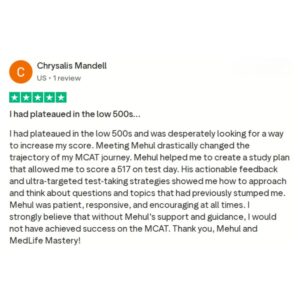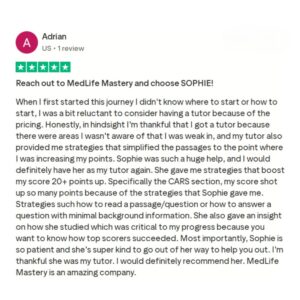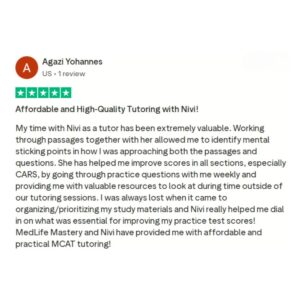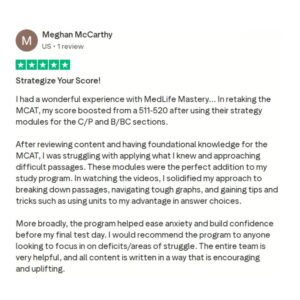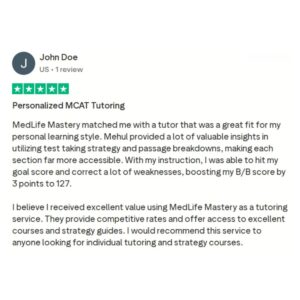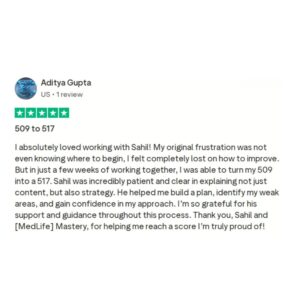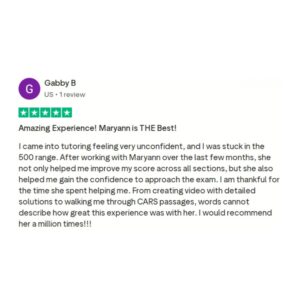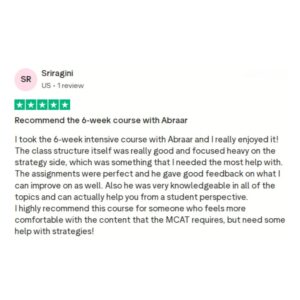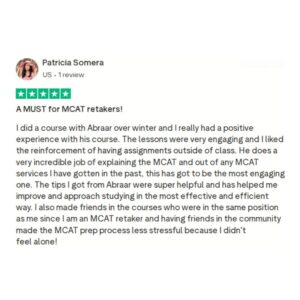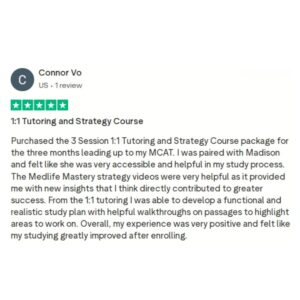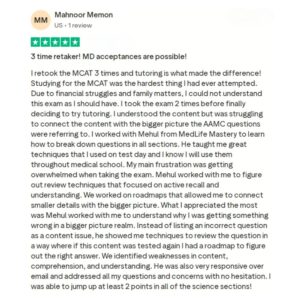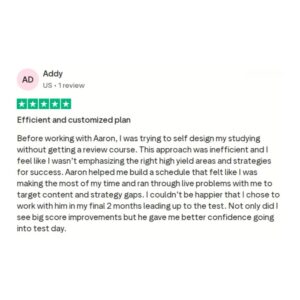Learn how to improve your MCAT score fast. Join one of these step-by-step MCAT Strategy Courses →
Some of us have it much harder than others and often feel ashamed for not being able to keep up like everyone else.
If you can relate, we want to let you know that it's okay to be different. You can succeed on the MCAT and achieve your doctor dreams. Want proof?
Meet Michael, who was diagnosed with a learning disability and Tourette Syndrome before high school. Tourette’s is a condition of the nervous system where you develop characteristics of not being able to control twitches, sounds, or movements (also called tics).
The MCAT was a struggle for Michael because he couldn’t concentrate for longer periods of time. He felt ashamed of this for being different and having to study the MCAT in a different way…
But he overcame it and ended up scoring a 517 (94th percentile)!
Here are a few of his tips and tricks on how to prepare for the MCAT with a disability. Whether you've been diagnosed with a learning disability, you feel like you're not a good test-taker, read slower than others, or if you feel like your score isn't improving no matter what you do, these tips will help make sure you're on the right track!
Take Advantage Of Available Resources At School (Or In The Community)
If you're going to tackle the MCAT with a learning disability, then you should take advantage of the Disability Resource Center at your school (or in the community, if the school doesn’t have one) and learn to seek out the services and resources available for you.
Reaching out to resource centers can help you develop your own plan for academic success—in your MCAT prep, your med school application, and throughout college.
Remember that there’s plenty of great resources out there for all kinds of situations. Some of which we provide ourselves like our article on how to conquer stress and anxiety!
Seek Out An Evaluation From A Psychologist Or A Specialist
This tip’s especially important if you’re considering getting accommodations on the MCAT!
Seeking out a professional evaluation can help connect you to resources or support that can lead you to understand your disability but to know what might help you.
In addition, an evaluation from a specialist or a psychologist is required when taking the MCAT with accommodations…
For some, registering for the MCAT with accommodations can feel like half the battle of MCAT prep itself.
It can be a challenging process if you don’t know what is expected of you ahead of time. That’s why we recommend that you consult the AAMC accommodations page here to make sure you’re 100% ready for the MCAT.Take Advantage Of Online Communities
If you don’t have access to the first few items above, try seeking out help and community support online!
Online communities are a great way to connect with others and feel less isolated, especially during such a challenging time.
Studying for the MCAT with a learning disability can sometimes feel isolating, so it feels nice being able to find advice and stories that are specific to your disability or situation and that only people who have dealt with your challenges can address or advise on.
Speaking of online communities, you should consider joining ours and learn more from your mentors here at MCAT Mastery like Michael.
Join the MCAT Mastery community, where you can receive the top tips and strategies and be a part of a system with thousands of students just like you.
Reflect On Your Strengths And Weaknesses As A Learner
For people preparing for the MCAT with a learning disability, there will be strengths and weaknesses in your learning…
So take the time to reflect and ask yourself what you struggle with, pinpoint your strengths and weaknesses!
Once you figure that out, you’ll be able to get a good plan moving forward on how you’re going to best study and prepare for the MCAT.
Make A Plan Specific To Your Individual Needs
If you're figuring out how to prepare for your MCAT with a learning disability, your plan should be very specific to your disability and to your unique needs.
Avoid comparing yourself to other people, even if they may have the same disability or challenges as you.
We know that we mentioned earlier that having people you can relate to in a community can help you with specific advice on specific challenges, but at the end of the day you're your own unique person.
Don’t be afraid if your specific plan is different from your peers. Everyone will need to find their own strategies and plans that work for them.
If you’re looking for somewhere to start with creating your MCAT plan, check out our top scorer MCAT prep study plan here!Trust Yourself, You Know Yourself The Best
Put in the time to know yourself as a learner—your strengths, weaknesses, your areas for improvement. Remember that there’s nothing wrong with having a different learning pace or style.
We all learn at different speeds and in different ways. It doesn’t make your capacity for success any lesser than the average person.
We hope these tips help you and hope Michael’s story inspires you to continue your MCAT journey to becoming a doctor…
If you find that you’re having difficulty preparing for the MCAT, be sure to also check out our complete strategy course, both put together by your top scoring mentors here at MCAT Mastery.
And if you feel like you’d benefit from our 1:1 guidance with a top scorer, we have tutoring options too!
And more importantly, know that you are capable of all the success that everyone else is.
Learning to study for the MCAT with a learning disability might be extra challenging, but it's not going to stop you from accomplishing your doctor dreams.
We all want nothing more than to see you succeed on the MCAT and get into med-school...And you will.
You got this,
The MedLife Mastery Team
Your MCAT Success Mentors


 To help you achieve your goal MCAT score, we take turns hosting these
To help you achieve your goal MCAT score, we take turns hosting these 

